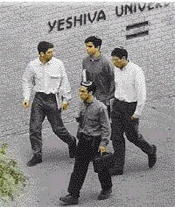 |


State's High Court is Being Asked To Hear Historic Case New York's Attorney General Backing an ACLU Lawsuit |
|
Compiled By GayToday
 New York, New York-- The first lawsuit in the nation challenging anti-gay policies in
university housing got a boost from the New York Attorney General, who filed
a brief this week asking the state's highest court to hear the American
Civil Liberties Union's lawsuit charging Yeshiva University with unlawful
discrimination for banning lesbian and gay people from living in campus
housing with their partners.
New York, New York-- The first lawsuit in the nation challenging anti-gay policies in
university housing got a boost from the New York Attorney General, who filed
a brief this week asking the state's highest court to hear the American
Civil Liberties Union's lawsuit charging Yeshiva University with unlawful
discrimination for banning lesbian and gay people from living in campus
housing with their partners.
The ACLU's Lesbian and Gay Rights Project is representing graduate students at Yeshiva's Albert Einstein College of Medicine, who were denied shared housing with their same-sex partners because they cannot marry. Charging discrimination on the basis of sexual orientation and marital status, the ACLU is seeking to overturn the policy and recover unspecified damages for emotional distress and extra housing and commuting costs. This week, the ACLU is asking the New York Court of Appeals in Albany to review a lower court decision that dismissed the case last spring. In that decision, the New York Supreme Court ruled that Yeshiva's housing policy is not discriminatory because "it had the same impact on non-married, heterosexual students as it had on non-married homosexual students." The ruling did not address the fact that lesbians and gay men cannot legally marry in New York or any other state. "Today's developments emphasize what we've said all along in this case - it simply denies reality to say that policies which favor married couples don't discriminate against lesbian and gay couples," said Michael Adams, Associate Director of the ACLU's Lesbian and Gay Rights Project.
"By completely eviscerating the notion of 'disparate impact,' the lower courts in this case have set a potentially dangerous precedent that could make it much more difficult to protect anyone from discrimination." Lesbian and gay students at the Albert Einstein College of Medicine are forced to choose between living with their partners or living on campus-- which is not only more convenient, but considerably cheaper. Market-rate apartments in the campus area are about twice the rate of campus housing, which ranges from about $330 a month for a studio to $767 for a two-bedroom penthouse apartment. Besides Yeshiva, Columbia University is the only other private university in New York City to offer housing to couples, and the only one whose policy includes domestic (same-sex or heterosexual) partners. New York University and Fordham University do not offer couples housing. Although comprehensive data do not exist, the ACLU estimates that, of colleges and universities that offer housing to couples, less than half include same-sex couples. While political and legal pressure has convinced many universities to adopt inclusive housing policies, the ACLU challenge against Yeshiva is the first in the country to reach a court. In 1989, Einstein's student/faculty senate passed a resolution asking for housing and other benefits for gay couples, but Yeshiva President Norman Lamm refused to approve the change. According to news reports, Rabbi Lamm has said that "under no circumstances can Judaism permit homosexuality to become respectable." Despite its origins as a religious school, Einstein, like all divisions of Yeshiva except its Rabbinical school, is today a secular institution open to students of all religions. Indeed, the school's promotional materials include a statement that "the University does not discriminate on the basis of sex, religion, age, race, handicap, color or national origin." But the school's policy restricts campus housing to students and their spouses and children, and states that "married couples, regardless of their position on the Waiting List, receive priority" for apartments, after providing "acceptable proof of marriage." The case is Levin v. Yeshiva University and the Albert Einstein College of Medicine. In addition to Adams, the ACLU legal team is headed by volunteer attorneys James D. Esseks and Karen Honeycutt, with the New York firm Vladeck, Waldman Elias & Engelhard. |

